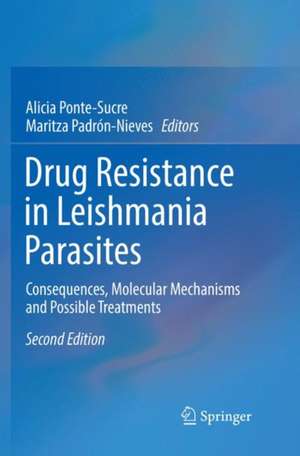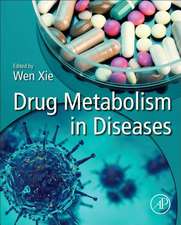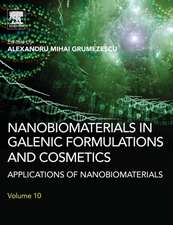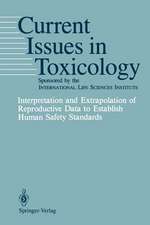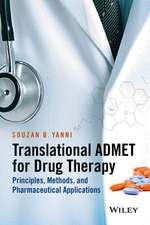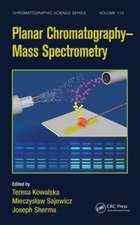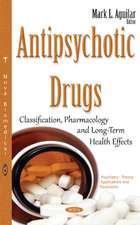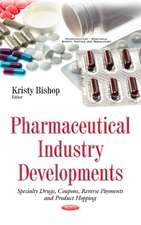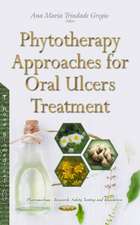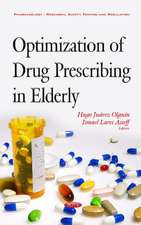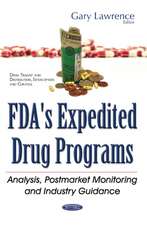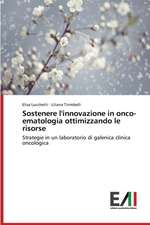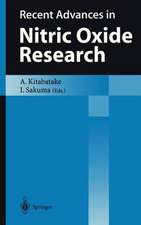Drug Resistance in Leishmania Parasites: Consequences, Molecular Mechanisms and Possible Treatments
Editat de Alicia Ponte-Sucre, Maritza Padrón-Nievesen Limba Engleză Paperback – 22 dec 2018
| Toate formatele și edițiile | Preț | Express |
|---|---|---|
| Paperback (1) | 674.14 lei 38-44 zile | |
| Springer International Publishing – 22 dec 2018 | 674.14 lei 38-44 zile | |
| Hardback (1) | 702.04 lei 38-44 zile | |
| Springer International Publishing – 5 sep 2018 | 702.04 lei 38-44 zile |
Preț: 674.14 lei
Preț vechi: 709.62 lei
-5% Nou
Puncte Express: 1011
Preț estimativ în valută:
129.01€ • 134.19$ • 106.51£
129.01€ • 134.19$ • 106.51£
Carte tipărită la comandă
Livrare economică 10-16 aprilie
Preluare comenzi: 021 569.72.76
Specificații
ISBN-13: 9783030089306
ISBN-10: 3030089304
Pagini: 376
Ilustrații: XVII, 376 p. 24 illus., 14 illus. in color.
Dimensiuni: 155 x 235 mm
Ediția:Softcover reprint of the original 2nd ed. 2018
Editura: Springer International Publishing
Colecția Springer
Locul publicării:Cham, Switzerland
ISBN-10: 3030089304
Pagini: 376
Ilustrații: XVII, 376 p. 24 illus., 14 illus. in color.
Dimensiuni: 155 x 235 mm
Ediția:Softcover reprint of the original 2nd ed. 2018
Editura: Springer International Publishing
Colecția Springer
Locul publicării:Cham, Switzerland
Cuprins
Prologue.- Introduction.- Part I Determinant features in Leishmaniasis.- Molecular evolution and phylogeny of Leishmania.- The role of reservoirs: canine Leishmaniasis.- Epidemiology of Leishmaniasis in the time of drug resistance.- The role of the immune system in resistance to infection.- Part II Challenges in the diagnosis, treatment and control of Leishmaniasis in the times of drug resistance.- Co-infection with HIV.- Visceral Leishmaniasis.- Tegumentary Leishmaniasis.- Antimony accounted sequel post Kala-Azar dermal Leishmaniasis.- Part III Molecular featrues of drug resistant Leishmania.- Genetic Expression and drug resistance, the role of proteomics.- The role of AMC transporters in drug-resistant Leishmania.- Functional analysis of Leishmania membrane (non AMC) transporters involved in drug resistance.- Part IV Pharmacology and chemotherapy of Leishmaniasis.- Classical vs. novel treatment regimens.- Bioinformatics in Leishmania drug design.- Leishmanis mitochondria, a druggable organelle.- P-glycoprotein-like transporters in Leishmania: a search for reversal agents.- Part V Strategies to circumvent drug resistance in Leishmania.- The relevance of susceptibility tests, breakpoints and markers.- The concept of fitness in Leishmania.
Recenzii
“The chapters in this book are appropriate for beginning students and seasoned Leishmania researchers alike. … This could serve as an excellent foundation for those who are new to the field of Leishmania and a tremendous source of reference for more advanced researchers. It is well organized, chapters are well written and referenced, and there is minimal overlap between chapters.” (Ivy Hurwitz, Doody's Book Reviews, August 16, 2019)
Notă biografică
Professor Dr. Maritza Padrón Nieves
Maritza Padrón Nieves studied Biology at UCV in Caracas and became Magister Scientiarum in Pharmacology in 1993 and Doctor of Sciences in Pharmacology in 2011 in the same university. From 1994 to 2000 she was head of the Department of Basic Sciences at the School of Nursery, UCV. Currently she is Full Professor and head of the Human Pharmacology and Toxicology Chair, Faculty of Medicine, UCV. Initially her research interests were related to the comprehension of the mechanisms involved in digoxin intoxication. Since 2006 she has dedicated her scientific interest to the identification and characterization of molecular markers of resistance in the Leishmania sp. infection model.
Professor Dr. Alicia Ponte-Sucre
Alicia Ponte-Sucre studied Education in Biological Sciences at the Andrés Bello Catholic University in Caracas and became Magister Scientiarum in Physiology and Biophysics in 1981 at the Venezuelan Institute of Scientific Research and Doctor of Sciences in Pharmacology in 1993 at the UCV. She spent a year (1999-2000) at the University of Würzburg with a scholarship from the Alexander von Humboldt Foundation and was a staff scientist (2003-2007) at the same university, within a multidisciplinary project from the German Research Council. Currently she is Full Professor in Human Physiology and Coordinator for Scientific Affairs of the Faculty of Medicine, UCV. Initially, her studies were focused on the physical-chemical behavior of black lipid membranes. Later, her scientific activity was oriented towards the characterization of receptors involved in air-way smooth muscle contraction. During the last 30 years her interests have been focused towards the study of parasite metabolism and membrane transporters essential for parasite survival and involved in drug resistance, and the mechanisms involved in cellular differentiation and parasite-host interaction in Trypanosomatids, but especially in the Leishmania model. Additionally she has characterized natural products and target oriented designed compounds as potential therapeutic agents against diseases produced by these parasites.
Maritza Padrón Nieves studied Biology at UCV in Caracas and became Magister Scientiarum in Pharmacology in 1993 and Doctor of Sciences in Pharmacology in 2011 in the same university. From 1994 to 2000 she was head of the Department of Basic Sciences at the School of Nursery, UCV. Currently she is Full Professor and head of the Human Pharmacology and Toxicology Chair, Faculty of Medicine, UCV. Initially her research interests were related to the comprehension of the mechanisms involved in digoxin intoxication. Since 2006 she has dedicated her scientific interest to the identification and characterization of molecular markers of resistance in the Leishmania sp. infection model.
Professor Dr. Alicia Ponte-Sucre
Alicia Ponte-Sucre studied Education in Biological Sciences at the Andrés Bello Catholic University in Caracas and became Magister Scientiarum in Physiology and Biophysics in 1981 at the Venezuelan Institute of Scientific Research and Doctor of Sciences in Pharmacology in 1993 at the UCV. She spent a year (1999-2000) at the University of Würzburg with a scholarship from the Alexander von Humboldt Foundation and was a staff scientist (2003-2007) at the same university, within a multidisciplinary project from the German Research Council. Currently she is Full Professor in Human Physiology and Coordinator for Scientific Affairs of the Faculty of Medicine, UCV. Initially, her studies were focused on the physical-chemical behavior of black lipid membranes. Later, her scientific activity was oriented towards the characterization of receptors involved in air-way smooth muscle contraction. During the last 30 years her interests have been focused towards the study of parasite metabolism and membrane transporters essential for parasite survival and involved in drug resistance, and the mechanisms involved in cellular differentiation and parasite-host interaction in Trypanosomatids, but especially in the Leishmania model. Additionally she has characterized natural products and target oriented designed compounds as potential therapeutic agents against diseases produced by these parasites.
Textul de pe ultima copertă
Drug resistance is a fundamental factor in treatment failure in diseases like leishmaniasis, although additional factors also play a role in this phenomenon. This volume is the second edition of a well-received book that provides a comprehensive update on the pathology of the disease, as well as on the concept of parasitic drug resistance, its molecular basis, consequences and possible treatments. A valuable resource for scientists both from academia and industry involved in biomedical research and drug design, the book provides the knowledge needed to understand leishmaniasis and to contibute to combatting this disease worldwide.
Caracteristici
Contains new chapters on metabolism Provides detailed information on basic principles of and new findings in Leishmania and Leishmaniasis Multi-authored with contributions of interest for both individuals in academic fields and industry
